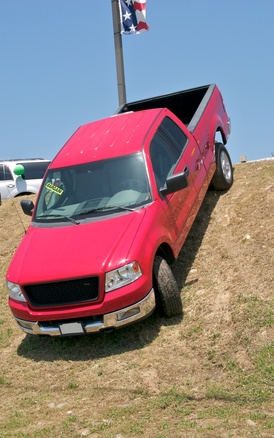
The Torqshift transmission provides the Ford Super Duty truck with more pulling and hauling power. The transmission is paired with the diesel engine in Ford Super Duty trucks, and there have been technical service bulletins (TSBs) as well as reports of problems being experienced by some of these trucks' owners.
A TSB was issued by the manufacturer about reports of bucking and jerking experienced by owners of trucks equipped with the Torqshift transmission. Most of these issues occurred under load or while hauling, but some reports of bucking and jerking occurred during normal operation. This transmission problem is attributed to a transmission fluid leak reported in another TSB. The leak was thought to be coming from the rear seal of the transmission but was found to be coming from the torque converter and gasket where the Torqshift transmission and engine fit together. Low transmission fluid causes the transmission to jerk during driving, and the seals as well as the gasket must be replaced to correct this problem.
Another TSB published about the Torqshift transmission concerns harsh shifting and slipping between gears. This transmission problem occurs primarily under cold conditions or when the vehicle has not been driven for some time. The problem is attributable to the Torqshift's solenoid. The remedy involves replacing the body of the solenoid, along with the solenoid wiring harness. The solenoid body was installed without a pressure sensor which causes harsh shifting and slipping of gears.
Many complaints as well as a TSB published on the Torqshift transmission concern a excessive delay when shifting the transmission into reverse or forward. This transmission problem is due to a sticking line pressure control solenoid. Over time, the line will develop a buildup of metallic debris from a defective reverse pinion shaft; this will clog the line, and the pressure control solenoid will stick. The Torqshift transmission must be disassembled and the pinion shaft replaced in order to correct this problem with the reverse gear. If there is no metallic debris in the fluid or the line, the solenoid wiring harness is the cause of the delayed forward drive and must be replaced.